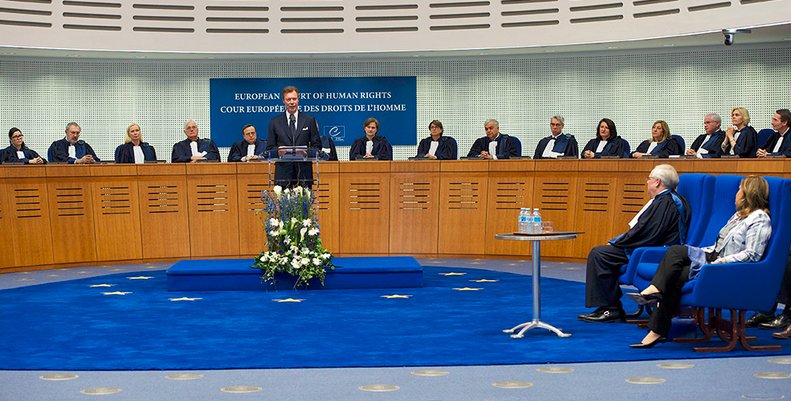‘Do as we say, don’t do as we do.’
There are so many aspects to the current immigration crisis which are, or should be, stretching the patience and goodwill of people across Europe to breaking point.
Not the least of which is the blatant hypocrisy of the EU in refusing to sign up to the rulings of the European Court of Human Rights (ECHR), whilst insisting that every other nation under its jurisdiction do so.
We are as ever obliged to our research affiliate Brexit Facts4EU.Org for shedding light on the EU’s dealings with the ECHR, and for exposing the sheer waste, extravagance and institutional prejudice which lie at the very heart of this relationship.
That anyone can continue to have confidence in organisations as politically and operationally compromised as these two beggars belief.
If nothing is done from above to address these anomalies, it cannot be long before change is demanded from beneath. We too will be in the vanguard, joining those campaigning for that change.
We publish the report in full below with a link to the original beneath it.
EU insists the UK must stay under the ECHR,
but won’t sign up itself
This foreign court effectively overrules the UK’s Supreme Court
Facts4EU.Org summarises the illogical madness behind a non-EU but quasi-EU institution
The Government’s latest attempts to solve the illegal boat migrant crisis created by President Macron’s refusal to take back his migrants hinges on deporting the people who arrive to a processing centre in Rwanda.
It is well-known that this was stopped by UK lawyers appealing to the European Court of Human Rights (ECHR) in Strasbourg, France.
One single ECHR judge sitting in France one evening overruled the Supreme Court of the United Kingdom. Here are some facts about the ECHR which readers might wish to know.
SUMMARY
The European Court of Human Rights – some basic facts
- ECHR is based in a grandiose suite of buildings in Strasbourg, France – purpose-built
- The whole thing cost a fortune, with over 300,000 sq ft of floor space
- The courtroom alone covers over 9,250 sq ft
- Context: Average size of an entire property in the UK is circa 730 sq ft – 1/12th the size of the courtroom
- There are 46 member countries, 27 of which are EU members
© ECHR 2022 – click to enlarge
- The EU insisted the UK submitted to the rulings of the ECHR
- However the EU has not submitted itself
- It is not possible to bring any legal case against the EU at the ECHR
- It is, however, possible to bring a legal case against the UK
- As at 30 June 2023 there were 76,750 pending applications to the court
- There have been over 900 cases in total against the UK
- Until March 2022 it was still possible for a Russian judge to rule on ‘human rights violations’ in the UK
[Sources: ECHR | EU Commission]
If the ECHR is so independent of the EU, how come it has the EU carpet in its courtroom?
It is often said that the ECHR is part of the Council of Europe, not the European Union. Technically this is true. However we invite readers to study the photograph below, which comes from the ECHR’s website.
© ECHR 2022 – click to enlarge
If the ECHR is so independent of the EU, readers might question why the main judging chamber of the ECHR has an enormous EU flag on its floor. Why not an amalgam of all the flags of countries which are members, including the United Kingdom?
The EU insists the UK must stay under the ECHR, but won’t sign up to it itself
In what must surely be one of the most blatant acts of EU hypocrisy, the EU insisted as part of the UK-EU ‘Trade and Cooperation Agreement’ that the UK remained signed up to the ECHR.
And yet the EU will not sign up itself. Finally in 2013 it reached an agreement to join but was then blocked by its own court: the Court of Justice of the EU (ECJ). Ten years later the EU is STILL not a member of the ECHR.
Here is what the EU Commission has to say about the EU’s current position:-
“At present, all 46 Council of Europe member states, including the 27 EU Member States, are already parties to the European Convention on Human Rights. However, the EU itself is not. This means that actions of the EU’s institutions, agencies and other bodies cannot currently be challenged at the European Court of Human Rights in Strasbourg.”
– European External Action Service (EU Commission), 18 Oct 2021
The latest word on the EU’s website is “Negotiations for the accession of the EU to the ECHR were relaunched in September 2020 and are currently ongoing.”
To call this position breathtakingly hypocritical would surely be an understatement.
Does the UK’s Supreme Court have to obey the ECHR? Yes
It has been suggested by some commentators that the UK does not have to obey the rulings of the ECHR, but merely to treat them as ‘advisory’. Below is what the ECHR has to say about this.
“[The Court’s] judgments are binding on the countries concerned and have led governments to alter their legislation and administrative practice in a wide range of areas.”
– ECHR document, accessed 14 Aug 2022
So, the rulings are indeed binding, according to the ECHR.
Putin’s Russia, ruling on UK ‘human rights violations’
Russia has long been a pariah state when it comes to human rights. The list of atrocities is endless. Readers will remember the killing in London by Russian security services of the dissident Alexander Litvinenko using a radioactive substance, to say nothing of the attack in Salisbury several years later.
Russia has also violated other nations’ territories (eg Crimea, Chechnya, Ukraine) in contravention of international law and yet it continued to be a member of the European Council and have a judge on the ECHR.
Finally last year, Russia was excluded. Incredibly, until March 2022 it was possible for a Russian judge to rule on ‘human rights violations’ in the UK.
‘Rule of law’? – What law?
The UK gave the world the Magna Carta, Habeas Corpus, and the principle of Common Law.
Conversely the ECHR operates under the principle of the Napoleonic code of Corpus Juris, where you are in essence assumed to be guilty, can be held in detention for very long periods, no right to silence, and none of the other rights which the British people take for granted.
The sole British judge on the ECHR was born and educated in Germany
Facts4EU.Org has analysed the judges of the ECHR. We also looked at the ‘seniority’ as defined by the ECHR.

The sole British judge was born and educated in Germany and sits down at No. 20 in terms of precedence, below the judge from the tiny country of Cyprus. He moved to the UK in 1988, after completing legal studies in Germany.
In 2016 ECHR judges were paid €200,000 per annum tax-free. In today’s terms in pounds for a normally-taxed person that would be the equivalent of over £300,000 per year.
Photo left: Judge Eicke, the British judge © ECHR
To put the ‘British’ judge’s position into context, a judge from the tiny principality of Andorra (of which President Macron is the Prince) is 14 places above him in terms of seniority. A judge from Bosnia is 11 places above him. And a judge from Serbia – hardly known for its human rights – is nine places above him.
BREXIT DOCUMENTARY UPDATE:

We’re now so close to the full funding for completing ‘The Independence Documentary’
We just need to raise the last £6,000 for the ‘post-production editing’. Can you help us to get over the line?’
Together with our partners at Brexit Facts4EU.Org, we’ve organised a TV-style film with a stellar line-up of well-known politicians and all kinds of interesting people, men and women, white and ethnic origin, presented by Alexandra Phillips.
Jacob, Nigel, David Jones, John Redwood, Kate Hoey, Lord Cruddas, Ann Widdecombe, Richard Tice, Ben Habib, and many more. The big launch to the public and the media is set for 02 October.Our presenter Alex will be known to many readers as an ex-GB News presenter and a frequent sight on everything from Question Time to Talk TV.
We’ve finished filming – now we have the difficult task of editing by our professional production team, if we can get some extra funding. This is going to be big!
Please help today if you can:
OBSERVATIONS
It’s difficult to know where to start with the absurdity that is the European Court of Human Rights
Like the European Court of Justice (CJEU) to which the United Kingdom is subservient under the terms of the UK-EU Withdrawal Treaty, the ECHR is a highly-politicised court. You don’t get elected as a judge unless you’re a fully paid-up member of the human rights fraternity.
Facts4EU.Org is non-partisan but we are firmly against the ‘open borders’ and ‘all migrants are refugees’ mentality which exists in most of the Establishment. We believe in looking at the facts.
The EU’s total hypocrisy
Bizarrely, the EU requires all its member countries (which included the UK) to submit to this Court, but then its own ECJ blocked the EU from doing the same thing. It is therefore impossible to take the EU to the ECHR. The UK can be tried and convicted – the EU can’t.
We constantly hear the claim that “The ECHR is not part of the EU”. Really? So why does it have the floor of its main judging chamber carpeted with an enormous EU flag?
The British lion must roar
The United Kingdom has a very proud record in standing up for human rights. Real human rights. We also have a proud record of taking in vast numbers of refugees. It has barely been mentioned in the media, for example, that the UK has already taken in more than 100,000 refugees from Ukraine.
The UK has courts, the High Courts, the Court of Appeal, and the Supreme Court. We have no need for a foreign court – with some questionable judges sitting on it – to dictate its views to the United Kingdom.
We should stand tall and demand fundamental changes to organisations such as the European Council, the ECHR, and the United Nations and all its innumerable agencies.
If these are not immediately taken seriously we must ultimately withdraw. Resiling from the ECHR would be a good first step.
The original article can be found here.
CIBUK thanks its Affiliated Organisation Brexit Facts4EU.Org for permission to republish this article.
Main image: montage © Facts4EU.Org 2022


